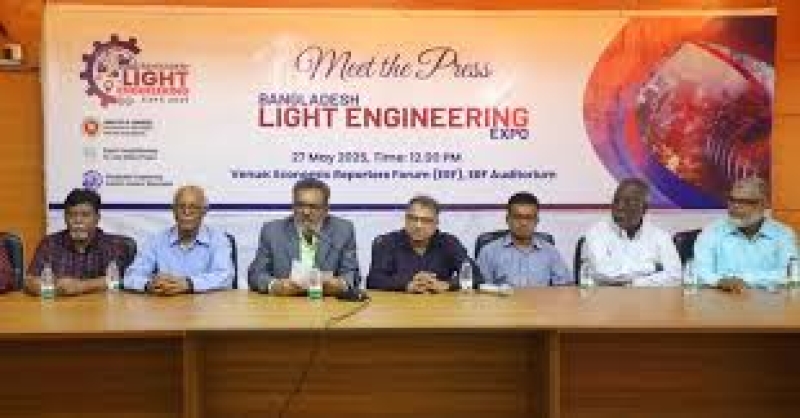- Puppet show enchants Children as Boi Mela comes alive on day 2 |
- DSCC Admin Salam’s drive to make South Dhaka a ‘clean city’ |
- 274 Taliban Dead, 55 Pakistan Troops Killed |
- Now 'open war' with Afghanistan after latest strikes |
- Dhaka's air quality fourth worst in world on Friday morning |
Light Engineering Expo: Bangladesh Eyes $100B Export Goal

Bangladesh is poised to significantly increase its footprint in the global engineering and light engineering products market, currently valued at a staggering US $7 trillion - of which the country's contribution amounts to less than 1% at present.
Industry leaders rather bullishly believe that with adequate policy support, investment, and infrastructure development, Bangladesh could export up to $100 billion worth of engineering products.
This optimistic outlook was shared by Md. Abdur Razzaque, President of the Bangladesh Engineering Industry Owners’ Association (BEIOA), during a press conference held on Tuesday at the Economic Reporters Forum Auditorium in Dhaka.
The press conference announced the upcoming Bangladesh Light Engineering Expo 2025, organized by BEIOA in collaboration with the Export Competitiveness for Jobs (EC4J) project under the Ministry of Commerce.
The domestic market for engineering products in Bangladesh is approximately Tk40,000 crore, with local industries fulfilling up to 50 percent of the demand, leaving the remainder to imports.
BEIOA president Razzaque highlighted the light engineering sector's substantial contribution to the national economy, employing over 3 lakh people and contributing nearly 3 percent to the country’s GDP. The sector's annual exports exceed $795 million, playing a crucial role in economic diversification and job creation.
The Bangladesh Light Engineering Expo 2025 is scheduled for May 29 and May 30 at the Shahid Abu Sayed International Convention Center, Shahbagh, Dhaka. The two-day event will feature leading domestic light engineering companies showcasing their latest technologies, components, and innovative products. Participating firms will have the opportunity to present their goods and services, connecting with new buyers and potential investors.
Selected companies will exhibit products such as dye and mould, industrial parts, agricultural equipment, metal casting, and electric equipment.
Razzaque emphasized that the expo serves as a platform for BEIOA to seek government support for modernizing domestic industries, facilitating technology transfer, improving product quality, and expanding exports. He urged the government to provide incentives comparable to those offered by competing nations like Vietnam, China, and India to enhance the light engineering sector's global competitiveness and sustainability.
Key requests to the government include establishing compliance-enabled industrial zones for light engineering products, reducing customs duties on raw materials, and providing cash incentives and priority access to bank loans.
He also stressed the need for technology transfer, modern design development, and necessary training for technical excellence. Furthermore, Razzaque called for a simple and effective patent registration system to protect locally manufactured components and designs, and appealed for training and incentives to increase employment opportunities for women and youth.
Responding to journalists' questions, Razzaque confirmed that the expo will feature 44 stalls from 27 domestic companies.
Md. Abdur Rahman Khan, EC4J Project Director, stated that the light engineering sector is one of four sectors that can closely compete with the readymade garment industry.
He assured that the government is working to meet the demands of the sector to facilitate further improvement.
Khan highlighted the expo as a crucial platform to connect manufacturers, importers, and buyers, emphasizing that showcasing Bangladesh's potential will help reduce import dependency and accelerate exports, reports UNB.

